Optimism
Slept in and grabbed lunch at Wholly Cow, a locally-sourcing grass-fed burger joint in downtown Austin. The place was busy, and so we waited for our food and people watched other people waiting for food. When it did arrive, truly fabulous. From there we camped out at a cafe and sent out e-mails and downloaded footage.
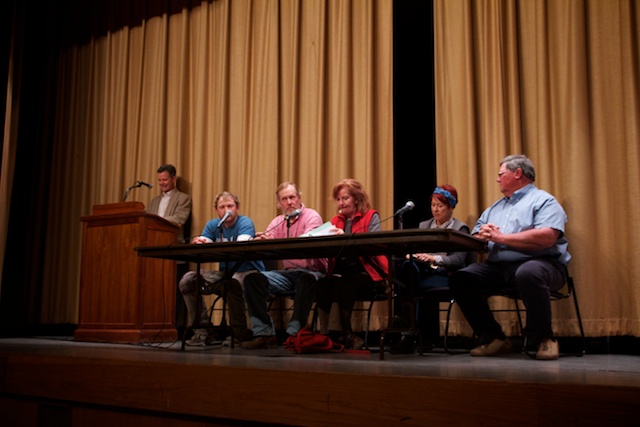
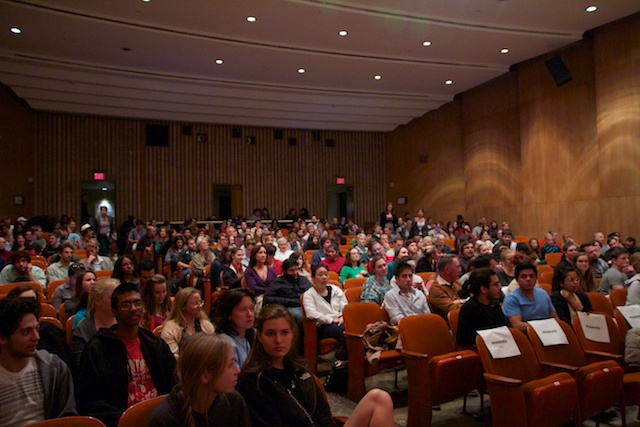
Read more
Wall Street Trader-Turned-Farmer
Check out this fantastic piece, "The Futures of Farming" on Le Monde Diplomatique by Liz Rush, about how people are shifting from corporate careers into farming, and how financial markets are affecting prices of food.
The article features Jon McConaughy, a former Wall Street trader-turned-farmer who will be participating in the New York premiere of American Meat in April!
"Just off of Country Road 518 in Hopewell, New Jersey, sits Double Brook Farm. It’s run by a self-exiled New Yorker but it’s not one of those now-standard upstart farms, with roving bands of earnest college kids tending rocket and a hearty couple of ex-Brooklynites overseeing the whole grass-fed operation. Double Brook’s turn-of-the-century-barn, its grazing cattle, and its hundreds of Rhode Island Reds clucking and strutting about all belong to Jon McConaughy, a 46-year-old with an all-American face, a football player’s build, money to blow, and a beautiful wife. Last year, McConaughy exchanged a two-decade long career as a commodities trader on Wall Street for these two hundred acres.
Double Brook, a small farm specializing in grass-fed meat, free range poultry, and various vegetables symbolizes one of the most unexpected turns the American economy has taken in recent years. For decades, banks have shied away from granting loans to farmers because, like restaurants, farms are considered risky investments. But the tides might be turning as the price of nearly every commodity on the face of the earth is on the rise.
'Farming is the new "good investment," says McConaughy, who grew up in the dairy country of rural New Jersey, only five miles from Double Brook. 'I always knew I was going to return to the farm. But I am not the only banker-turned-farmer—it’s a trend.'"
What We Value
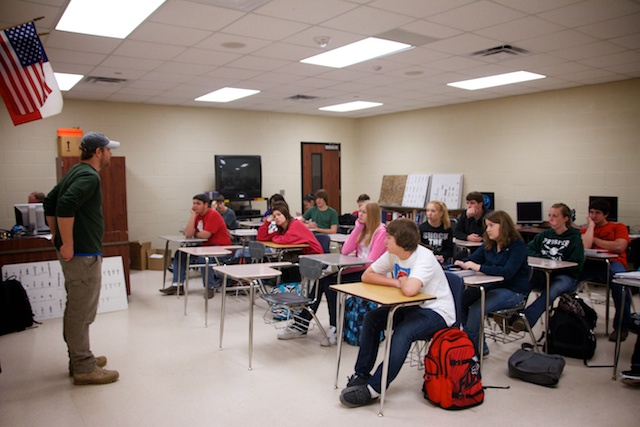
Read more
FFA Friday
Friday was our last day of screenings in California, and we were lucky enough to screen the documentary for two FFA chapters in the Central Coast. This is the region of America that grows most of our nation's vegetables, and a lot more than that. It's a perfect climate, never snowing, and driving through there are towns dedicated to crops- like the "garlic capital of the world", or the "artichoke capital".
We arrived at Templeton HS before school started and were joined by Ms. Thompson's first period class of 25, and then by her second period of 25 as well. The students were so engaged, so respectful, and asked very intelligent questions. After the class was over, students took the time say thanks, before heading to the next period.
We thanked Ms. Thompson, and the kind woman managing the space. We drove South to San Luis Obispo, where we had lunch of rice cakes, peanut butter and honey before heading to San Luis Obispo HS. The parking lot has many solar arrays, that double as garages. Big stands hold solar panels, and cars park underneath, with the solar panels powering the school.
Ms. Evans was kind enough to host us, and I was introduced by the FFA chapter president, Ben, who had a natural inclination towards public speaking. We watched the first third of the film, before Joel Judge, another farmer named Steve Johns and a veteranarian named Marissa Greenburg joined a conversation with the 120 students crammed into a room for 80. Students asked a lot of questions, and the good folks on the panel shared knowledge. Joel's daughter was in the room, and he made a point to let everyone know :) There were some differences of opinion about agriculture in the room, however, by the end of the day there was a lot we could all agree on. Firstly, and most importantly, that it's a great time for young people to get into agriculture, and that our rural heritage is vital to our identity and our success as a nation.
After buying an external hard drive, and getting some food, we headed South to Los Angeles. Next stop, Texas.
Coming Together in Davis
Hey! I am a third year Community and Regional Development major and Chicano Studies minor at
UC Davis. I am the Event Coordinator for the Campus Center for the Environment, which is a resource
center/environmental advocacy unit of our student government. I wanted to host the American Meat
documentary at Davis because I knew it would touch on subjects that are important to many of our
students. We recently added a Sustainable Agriculture and Food Systems major to accompany our
other agriculturally related majors, so we have a lot of students who are passionate about incorporating
sustainability into our food production. Though I am not a Sustainable Ag and Food Systems major,
I am also passionate about how our food systems work, especially in terms of access to healthy,
whole foods and so I was interested in learning more about how we could make sustainably and
environmentally conscious food production feasible on a large scale. I was really happy with how the
movie screening went! We had over 200 students come, and I am certain that the free Chipotle had
nothing to do with it... It was a really fun crowd and we had a GREAT panel of farmers/butchers/feed
producers etc. I think the students got a lot out of the movie as well as the panel and we had some great
discussions happening where students got to talk about their interests with our super knowledgable
panelists!
Everything is Connected
Everything is connected.
Our day started off easily enough, awaking in Sacramento, packing up our things and heading South. We drove the rental along the highway through the rolling green hills and past the oil refineries, that are not as pretty, and yet made it possible for us to be driving the car.
We lunched at Cheese Board in Berkeley, the pizza of the day involving roasted potatoes, a choice only a master would make. The result was heavy on the stomach, and subtle flavor, an excellent meal we finished just as live music began.
With the size of the RSVP list for Stanford, we wanted to get there well in advance, and did. We spent the afternoon in Meyer Library, editing, e-mailing, in concentration staring into computer screens in a room full of students doing the same.
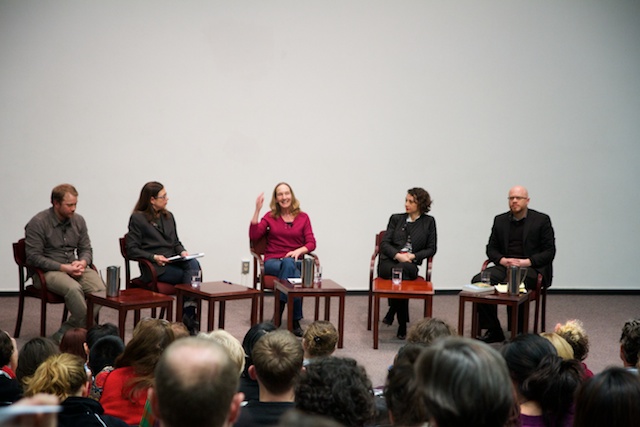
Rohisha greeted us, as well as Maria, Priya and Caroline, the kind students of the Stanford's group Appetite for Change who were kind enough to host the event.
Shortly thereafter, I got to meet Bonnie Powell, a kindred journalistic spirit, who like myself aspires to further conversations that construct our next food system. She introduced me to Maisie, who is a colleague of Bonnie's at Bon Appétit Management Company (BAMCo), who has partnered with and sponsored our screening series. Maisie was to join myself in what was to be the most unforgettable panel I've ever been a part of...
Mike, a good natured sound engineer with a long salt and pepper beard, miked us up, and after Rohisha thanked the University's sponsoring organizations, I gave an introduction to the event, thanking our sponsors, and outlining our three core goals for the screening series. Thank America's Farmers, Support Young Farmers, Food Choices Matter.
The audience of 275 or so was very engaged, laughing often and loudly- catching subtle nuances that as a filmmaker too close to the material- it is often hard to know if people pick up on. The audience applauded as the credits rolled, and Debra, our wonderful moderator, a veteran of hundreds of panels across the world, started a panel that she would tell me later in the evening, was unlike anything she has ever seen before...
Read moreFinding Food Locally
With the increase in awareness and desire for more sustainable, better quality food comes the rise of new resources that help us find that food. One of the resources leading the way for locating and connecting with farmers and farmers across the country is LocalHarvest.
LocalHarvest is an excellent website that allows you to connect with farms from all over America. In addition to its farm directory listings it also serves as a platform for ordering local and national food.
It's nice getting to know Guillermo Payet, the website's founder, who fully backs and believes in the site's cause. Guillermo has a genuine love for food which is highlighted in the way he reminisces about the flavors from his home country of Peru.
In the video, he touches on his disappointment with American supermarkets and how most of the food is bland and flavorless. It's unfortunate that so many people associate American cuisine with Subway, Burger King and McDonalds when there is so much better quality food out there waiting to be found. From the exterior of America, it may seem like overblown supermarkets and fastfood chains reign supreme but with a little help from websites like LocalHarvest people have begun to understand the rich culture and heritage of many American meals. Guillermo started LocalHarvest out of the necessity to have flavorful foods and local farms listed in one place and the site has blossomed into a hub for people to reconnect with meal time.
LocalHarvest encourages and promotes a sense of community. Whenever available, the website lists the individuals running the farms helping to put a name to those providing the food. Not only can changing the way we see food help our health for the better, it can change the way we view the world as well.
Enthusiasm Abounds!
Today was filled with enthusiastic, energetic, positive, inspiring and animated people.
At 5am we hit the snooze button and were on the road by 5:30 or so to Oroville. Megan texted us back saying she was up and ready.
We drove through the pre-dawn fog and then into the dawn fog. The soft light before the sun breaks the horizon is wonderful for cinematography, so we drove along, hoping to make it to the farm, but knowing we were to far to arrive at what is known by some as the magic hour. Perhaps if we hadn't hit the snooze button.
It was still pretty enough when we arrived, and Megan greeted us with an unusual amount of energy for so early in the morning, mixing slop for her hogs, singing, and even finding time to get Andy a cup of coffee. Her enthusiasm was such that initially Megan wanted to talk to the camera while doing chores, however, we explained, for the first part of filming, we need folks to pretend like we're not there.
After feeding hogs, we jumped in the truck and drove out across thousands and thousands of acres. Thinking it was a short ride, I jumped in back, and learned the cold way just how freezing a 60 mile an hour wind is in the face when exposed in 30 degree weather.
Andy filmed as Megan fed minerals, the cattle a bit spooked because of the two extra people, were very reluctant to approach. Megan told us stories about the history of the farm as we bounced over scary old bridges, and around massive puddles. Back at the main base, we shot the interview. Megan talked with inspiring pride about her family's farm, her respect for her parents, and her hope to continue her family's farm legacy with a brood of her own.
We got some beef jerky and promises for honey and more beef jerky before saying goodbyes and thank yous. We headed back to Sacramento, and there, rested up for our upcoming screening at UC Davis.
Read moreQuestions Unanswered
Tuesday we screened at Sacramento State. It was a day of recovery, largely. We captured footage, logged, e-mailed and generally enjoyed the experience of not being on the way somewhere, or on the way out of somewhere.
The nutrition club there, with Tarra and Shauna, who did an incredible job of putting together a very smooth, well attended event. On that note, about 150 folks filled the room, and I introduced the film, thanking the partner organizations who made it possible, and outlining our 3 core purposes for the screening series. Thank Farmers, Support Young Farmers, Food Choices Matter.
The panel following featured a really really cool idea, which was to take questions from the audience at random, and to use those to drive the conversation. Kevin, the student moderator, chose questions and directed them to panel members. There were some great questions in there, about resources being used through agriculture, that one I tackled- mentioning that alternative agriculture can often save natural resources because of the decreased distances that animals and produce have to travel to reach the people who eat it. Less miles, basically meaning less fuel used. and about how Joy Culley of Lucky Dog Natural Beef- talked about how they raise their animals and sell them directly to customers, about the health benefits of eating grass-finished beef. One of Lucky Dog's customers, Danny, who owns a local market- Taylors Market- mentioned that the public is often completely unaware of what is going on, citing the marketing of "Angus" breed of cattle, which defined by the USDA only means that 51% of it's body is covered by black, and has absolutely no tie to the linneage or kind of cattle that is actually being processed and sold as Angus beef. A fact that explains why "Angus" is ubiquitous.
Read more
Kindness
We rolled out of the Oak Motel and headed over to Stanford's college radio station where Leslie Chung and Michael Cleveland Osborne of KZSU 90.1 fm hosted us for a conversation. Often on the road, when talking about similar topics, you find yourself telling the same stories again and again. Leslie was very prepared and thorough and engaged a conversation that broke out of the routine talking points that generally come up. This is both exciting, because often new ideas are discovered, and a bit perplexing, because when away from routine, it is easy to get lost, in either the words being spoken, or the emotions coming to the surface.
Michael told us to take the Dunbarton Bridge to Touro, and we did, arriving at the odd campus- one that is in the ruins of an old naval base- just in time for our noon screening. A crowd of 50 trickled in, and unfortunately, we were in a venue that seated substantially more than that. Because we only had an hour, we showed clips of the documentary and then talked about the context of the scene in the larger story of the film. As the clips played, I talked with our hosting professor Lucy, in the back shadows of the cavernous old stage, as the picture flickered on the screen. She's Kenyan, and has a natural kindness of spirit, offering to help our organization on a number of projects we are working on, including connections with some school gardens in her native country.
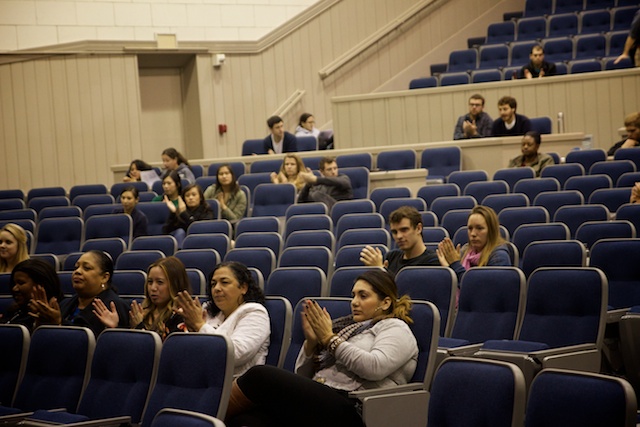
From there we inhaled lunch before heading to Acta Non Verba- latin for Actions Not Words- an urban garden in Oakland started by Kelly Carlisle. Kelly has a big personality, and a warm charismatic spirit. Everything she says has an aura of importance, and purpose. Her deep love and concern, and above all service, to her community is an inspiration. She talked about what she meditates on as she gardens, that as she prunes plants, she thinks about how she needs to prune some people out of her life, with a chuckle, people that bring her unnecessary drama. She talked about how she thinks about pruning out cigarettes of her life, before something happens to her health. Her honesty is so refreshing, and we're honored to have her as our first Young California Farmer.
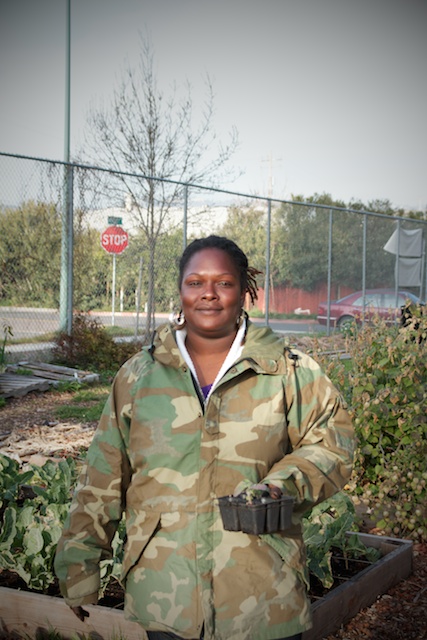
From there we jumped back in the white corolla rental, and drove to Berkeley, where we arrived at Sibley Auditorium to find hundreds of people clamboring for free burritos. Julie and Alannah carried them in, and we gave out the free food to the first 100 people in line. As people ate, behind the closed doors of the auditorium, myself and a few professors and volunteers were trying to get the 1980s equipment to play audio. The screening scheduled for 7pm, began to look precarious, as it seemed that the ancient technology may have ultimately crapped out. After over half an hour of switching out computers, cables, restarting everything again and again, we ventured a momentary solution- to have the panel discussion before the film, and then to buy speakers and project them from the laptop. I gave a longer-than-usual introduction- without a mic- to the 250 people in the auditorium, which as it turns out- bought just enough time for a very kind individual- who just emerged from the audience- to figure out and fix what looked like a truly hopeless situation. The movie played, with sound and everything. The projector was probably from the 1970s, and periodically added psychadellic RGB distortion to dark colors on the screen.
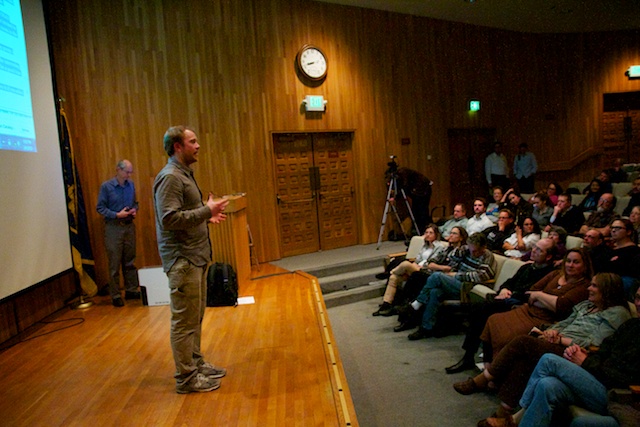
Following the film, Novella led the panel, moderating with ease and confidence, asserting her authority right away when a loud enthusiast began to list off a number of random ideas. Novella told her no, we'll only have questions. That set the tone. Nicolette Hahn-Niman talked about her unusual path weaving through environmentalism, law, cattle-raising and vegetarianism, often bringing the crowd to laughter.
John Wick talked about how he started out as a conservationist, meaning that he wanted to preserve nature. To do this, he bought land and got rid of all the animals on it, allowing it to return to its natural state. What he discovered was that the land actually needed animals to thrive, and he began reintroducing cattle, which in turn, reintroduced a plethora of grass species and unseen micro-organisms within the soil.
Gareth and Maura were there with a very newborn infant, talking about life as young farmers, and in a way, introducing themselves and what they do to the Berkeley community. We're ready to provide you with food, Maura said, with smiles abound in the audience.
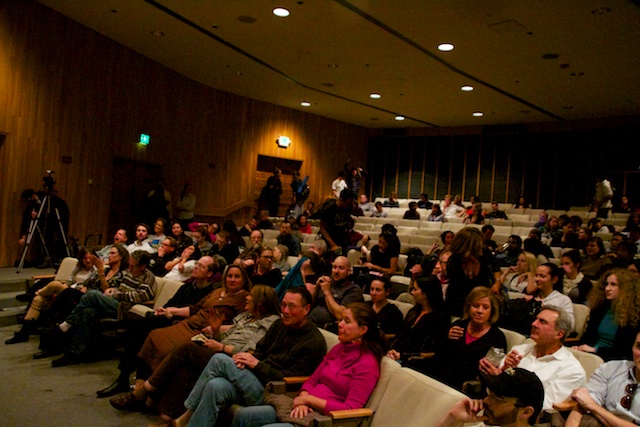
Lynn talked about how she appreciated the balance of the documentary, a public complement much appreciated. She's a professor at Berkeley who has been working towards goals that dovetail with John's, to essentially show how agriculture and healthy ecosystems can overlap. Nicolette offered improvements when it came to some of our calculations, which we will examine and certainly take to heart.
After the after-conversation with the engaged Berkeley community, we shared a late-night meal at the Chez Panisse café, grass-fed steak that won't soon be forgotten. It all seemed a dream, to be honest, just as much a weird one as a good one.
After food, we headed North to Sacramento and checked into Mike's home, which we found on the new thrifty site, Air BnB.